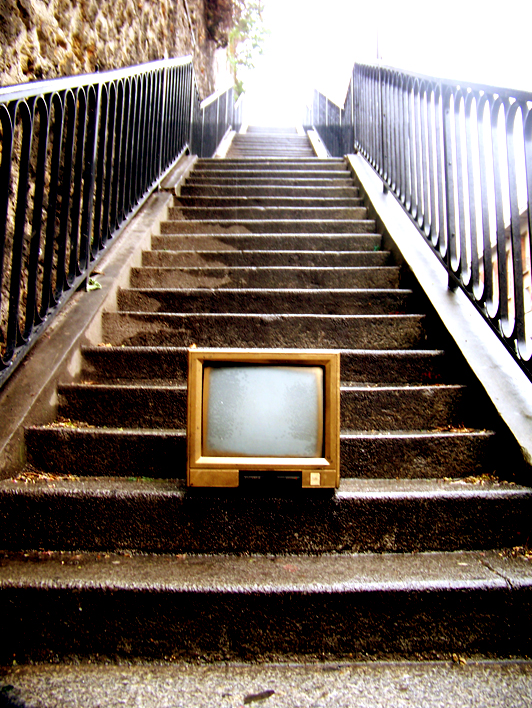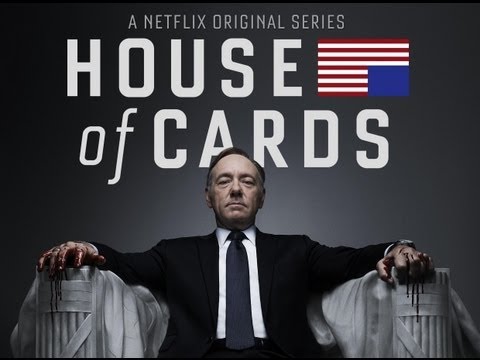This photo is the work of gildas_f.
This story starts with the data that Netflix gathers from its users. Netflix is a company that streams a huge variety of TV shows and films to anything you own with a screen and an internet connection, for £5.99 a month. When I talk about Netflix's 'Big Data' I mean the vast number of facts, mainly about its customer's viewing habits, that it stores on its computers. If you thirst for a deeper explanation of what Big Data is I recommend this utterly magnificent blog post here. Netflix is now using its customer data to inform its quest to create the perfect TV show!
So What Kind Of Data Does Netflix Store?
Now obviously it's not news that a company is using customer data to decide what TV show ideas to throw money at. What is news is the scale Netflix is doing it at. Netflix today has about 30 million subscribers. For the last 13 years they have all been watching, choosing, searching, 'favoriting', rating, switching off, fast forwarding, pausing, streaming on different devices and in different locations, following shows and getting bored half way through seasons. Netflix keeps records of all of this. This is Netflix's big data. In addition, all of Netflix's content has numerous 'tags' attached. These tags are small descriptions of genre, mood, the action, the actors etc. So Netflix has huge amounts of data on exactly how its 30 million subscribers like their TV served. And according to this data, what the people want is -
House of Cards
Image by Zennie Abraham
Set in Washington DC it follows Representative Frank Underwood's (Kevin Spacey) back stabbing strewn pursuit of revenge and political power. Netflix invested roughly $100 million for the first two seasons. Why were they so confident about their first big show? They looked to the data. It revealed a large overlap between users who had watched films by director David Fincher (like the social network) to the end, films featuring Kevin Spacey and the original British TV show the House of Cards. There was a recipe for a hit TV show right in Netflix's data. According to Netflix's data, viewers prefer binge watching numerous episodes at a time, not having them drip fed week after week. So Netflix released the entire season all at once. Netflix's canny use of viewer data gets canny-er. They showed different trailers for House of Cards to different users depending on what they knew that user liked. Kevin Spacey fans saw trailers that featured mostly him. 'Thelma and Louise' watchers saw trailers highlighting the female characters. Film aficionados saw trailers that focused on the director. So what's the show like?
The House that big data built turned out to be a huge success. It got great reviews, a bucketful of Emmy nominations and made money. So Netflix are doing it again.
Orange is The New Black
Authors of image are Netflix Company, Jenji Kohan (Producer) and Jordan Jacbos (Art Director)
A comedy set in a women's prison, Orange is the New Black is based on the autobiography written by Piper Kerman about her 15 months in a women's prison on a decade old drug crime. The main story follows Piper's struggling to live with the inmates. Flashbacks flash up to tell the story of what brought the inmates here and why Piper committed her crime. Just as with House of Cards, the data told Netflix to make this show. A high proportion of Netflix users all liked dark comedies, a good natured female lead and plots involving prison or crime. Unlike House of Cards however, Netflix didn't give Orange is The New Black a large marketing budget.
Netflix's Recommendations
Netflix builds a profile up of the TV Tastes of all its subscribers. This is used to generate recommendations of shows you might want to watch next. Netflix is getting pretty good at data driven recommendations - around 75% of its views come from its recommendation section. Orange Is The New Black didn't need marketing. Netflix knew which of its subscribers would want to see it and they knew that Netflix's recommendations are usually solid. Orange Is The New Black got more viewings in its first week than House of Cards or Netflix's Flagship show 'Arrested Development'.
The market is getting a lot more competitive for Netflix. It faces competent competitors like love film and Hulu. Netflix already operates on a very low margin and is facing increasing licensing costs for its content. There are going to be famous TV shows that Netflix subscribers are not going to have access to - Game of Thrones, The Sopranos, South Park etc. So Netflix is going to have to make the most out of the content it does have. You can get more value from a cheaper, unusual 'indy' TV show, if you recommend it to people you know would like it, but who might not search for it themselves.
Netflix's strategy is to use its Big Data to find viewers for TV shows that don't exist yet, make them and then recommend them to exactly those subscribers who will love them. Netflix is going to need the customer loyalty that this will create because it will need to increase its subscription fees soon. It's an interesting time to be either a Netflix subscriber or investor.


